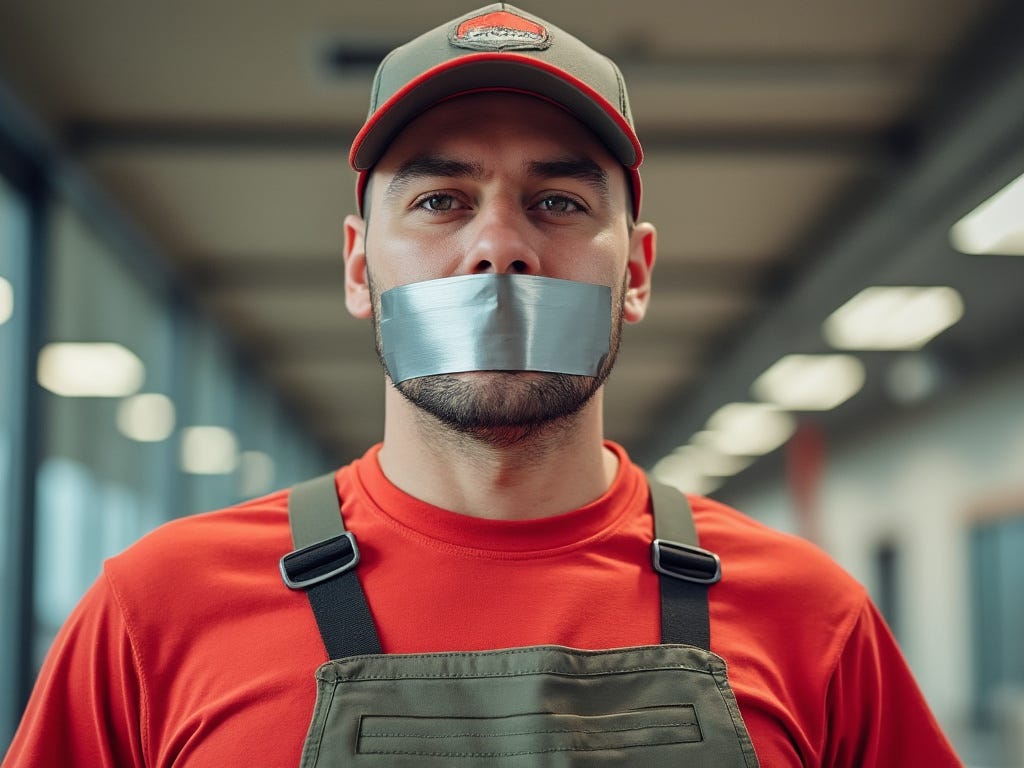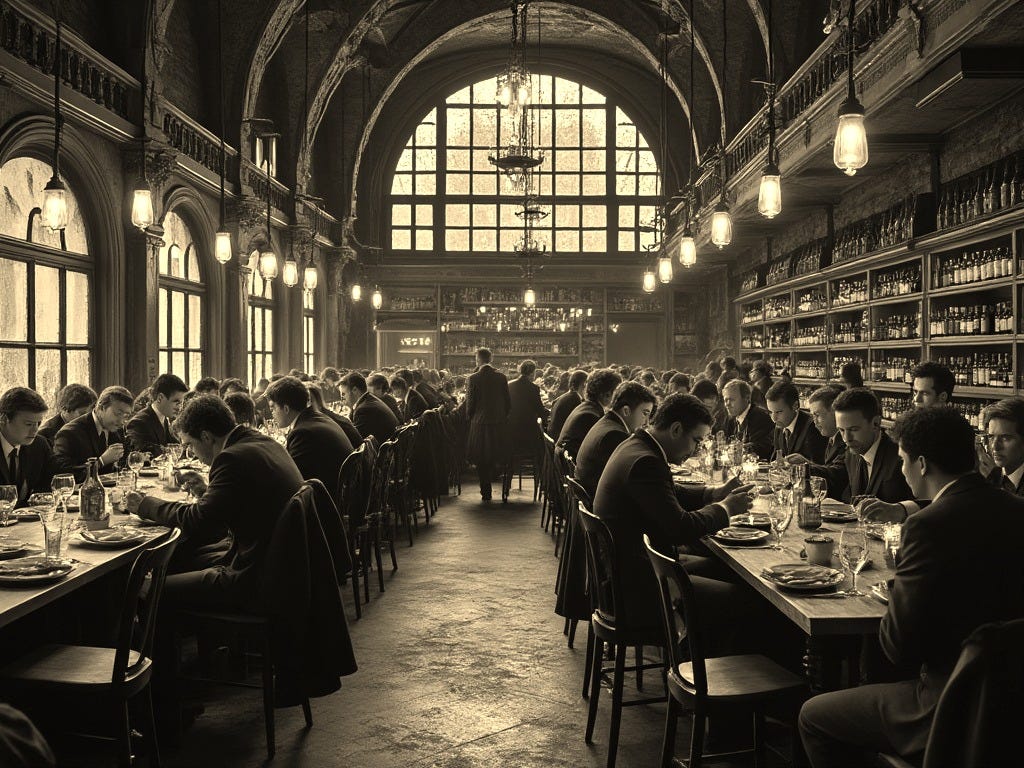Former Delivery Driver REVEALS Tipping Stereotypes
Some people tip better than others, but we're not allowed to talk about that.
To watch this article on Rumble, click here. For YouTube, click here.
Enjoy!
-GB
—
Years ago, I worked as a pizza delivery driver.
It wasn’t a bad gig.
I spent most of my time cruising around town listening to music, Rush Limbaugh, or All Things Considered on NPR (this was before podcasting was big). I achieved a decent daily step count, and they paid well.
What made for a good run varied. Some were close, some far. Sometimes, it was sunny and 75; sometimes, I got my Saturn stuck in the snow.
Sometimes, the customer was ready at the door.
Other times not, especially at hospitals, businesses, or campus buildings, which could waste 45 minutes of my shift hunting down nurses, executive assistants, or faculty members.
But even on the most challenging delivery, there was hope the customer would make up for it with a generous tip.
Unfortunately, there were certain customers who, regardless of service or weather conditions, would not provide gratuity.
We just weren’t allowed to talk about it.
Unspoken Expectations

I noticed a pattern after working the road for years at multiple locations. Unfortunately, articulating that observation would likely get me fired.
Of course, “drivers of color” were free to point out this pattern, but society programmed white employees to keep their mouths shut.
The dirty secret? Most black people don’t tip.
Of course, it wasn’t all black people. Sometimes, black customers were the highest tippers of the shift. Some even told me they did so to make up for the other blacks ordering pies.
But why?
One might assume income levels are to blame. Yet, poor whites in the trailer park tipped regularly.
Was that my “white privilege?” at play?
I doubt it, considering upper-class whites in 4,000-square-foot homes had no problem stiffing me before slamming the door in my face while whistling the Frasier theme song.
Since black drivers complained of not getting tips from black customers, too, I didn’t think my skin color was a factor.
However, some people suggested the practice of gratuity was “rooted in racism.”
To understand this fully, we must go back to the Tudor period.
History
Tipping has existed since the 1500s in Europe, where masters gave extra wages or gifts to servants when they went above and beyond.
This could be to incentivize quality service, to quell potential dissent, or maybe it was just plain generosity.
In later years, it became customary for guests to provide money, known as ‘vails’ to hosts, which they divided among the servants. This practice got out of hand as it became too expensive for people to visit, leading to public debate.
When royal families met in Scotland in the 18th century, they agreed to abolish the practice, saying the resolution should be to raise wages.
Of course, nobles didn’t agree entirely, and the controversy even led to riots in the streets of London.
Masters and visitors were split on the issue, making for awkward moments where perhaps neither visitor nor host knew where the other stood with tipping. Many visitors offered gratuity to be safe, hoping the host would refuse.
Aristocrats like Lord Sefton outright banned the practice on his estates, even placing notices around the property stating no servants should receive a tip.
Still, the custom survived throughout Europe, with countries varying in expectations. It’s widely believed that later, pubs would put a box on the bar reading “To Insure Promptitude,” or “prompt service,” later abbreviated to ‘tip.’
American Tipping
Although a widespread European practice, tipping didn’t exist in early America.
When American elites traveled to Europe in the 19th century, they brought the tradition back as perhaps a way to show others they were worldly.
And it didn’t go over well with everyday Americans who felt this idea of tipping was dated, classist, and outright un-American.
That’s why gratuity was insulting, as it still is today in places like Japan. A New York Times editor said in the late 1800s that tipping had spread rapidly like “evil insects and weeds.”
Like the Lord Seftons of the Tudor period, many restaurants posted “No Tipping. Tipping is Un-American!” signs in the windows. Some hotel owners even provided staff members with pocketless uniforms to make it more difficult for them to accept tips.
However, the practice picked up steam during the Industrial Revolution when people began amassing in large urban areas. With more restaurants, hotels, and other businesses popping up, more service jobs became available, and more people had an opinion on gratuity as a practice. Of course, most sided with the extra cash.
After Emancipation, many black people took such service jobs, which is where certain writers, content creators, and snooty liberal arts students make their argument for why tipping is racist.
Of course, although slaves gained freedom, they did not enjoy full rights, and therefore, many employers opted not to pay black service workers a base wage as they were earning tips. That’s true.
But this doesn’t make tipping itself racist. White lords and masters had been tipping white slaves since the 15th century.
So, where does the tipping disparity come from?
Cornell Study

Although many of us are censored from asking why most black people don’t seem to tip, Cornell freely approached the subject in a 2006 study titled Differences in Restaurant Tipping: A Literature Review and Discussion of Practical Implications.
Professor Michael Lynn, a white man, told the Los Angeles Times of the findings:
Research indicates that African Americans, on average, leave smaller tips for servers than whites do and that they’re more likely to leave nothing. -Professor Michael Lynn, Cornell University
Cornell confirmed what I already knew: it wasn’t an income issue. Results suggested that blacks tend to tip less, even when they reported higher income.
If it’s not money, do servers give poor service to black patrons because they assume they won’t get tipped anyway, creating a vicious bad-service/no-tip cycle?
Again, the data says no: black respondents admitted to tipping less or not at all, even when receiving good service.
So, what’s the story behind the racial factor in tipping?
According to research, many black people simply don’t know, concluding that whites were twice as likely as blacks to be aware of tipping practices.
Still, 1/3rd of white respondents weren’t familiar with the tradition either.
I knew there was more to the story.
Today’s Debate
Although relevant, this study is almost 20 years old, and I haven’t delivered a pizza in years.
How does the stereotype shape up today? I took to the internet to find out, and it’s still a hot topic.
For example, see this viral video where a black server admits that not only do her black customers fail to tip, but they are often the most demanding customers, making constant requests and complaints.
The Hodgetwins covered the issue a while back. A Domino’s driver wrote into the show claiming to have recorded their own stats while on the clock, finding that 73 of 81 black customers didn’t tip.
Anton Daniels, host of the Millionaire Morning Show, says he overtips to make up for the stereotype:
And the Black Public Media channel interviewed multiple people who reinforced the trend:
But Greg Foreman, host of the Black Conservative Perspective channel, identified the real culprit: it's not about race, it’s about culture:
The Actual Reason
It’s the same argument Ben Shapiro famously shut down a debate on racial income disparity in 2020:
“It has nothing to do with race and everything to do with culture.” -Ben Shaprio
That’s the missing piece. This is what the Cornell study fails to illustrate, what LA Times writers don’t mention, and what many people leave out of the conversation.
It’s the same subculture that equates success, punctuality, and education with “being white.”
It’s the same subculture that kills each other by the hundreds each year in cities like Chicago with rampant gang violence.
And it’s the same subculture that’s promoted the 20 million black abortions since 1973.
I observed this stereotype first-hand, and an Ivey League study reinforced my experience, as did countless people on podcasts and videos online. Still, for years, I was censored from saying so because it would have been “racist.”
Still, none of this fostered racist beliefs for me because I know the difference between race and culture.
Even when a black guy robbed me at gunpoint, I still didn’t think to blame “black people.”
So here’s my tip for the folks who felt they lost this election: Stop using black people as a political pawn. Stop perpetuating the negative black subculture by telling them they are victims and white people and America are systemically racist.
There’s nothing about skin color that determines how one tips. It’s nurture, not nature.
That’s why Trump picked up the black vote in 2024, and that’s why we won.







